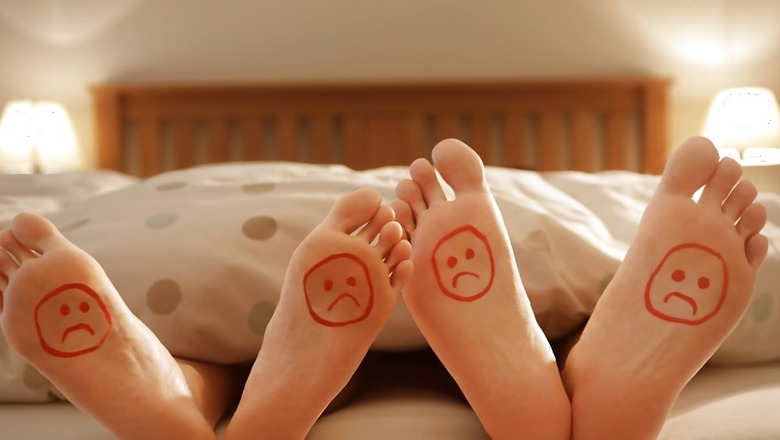
views
“Sex may permeate our popular culture, but conversations about it are still associated with stigma and shame in Indian households. As a result, most individuals dealing with sexual health issues or trying to find information about sex often resort to unverified online sources or follow the unscientific advice of their friends.
To address the widespread misinformation about sex, News18.com is running this weekly sex column, titled ‘Let’s Talk Sex’. We hope to initiate conversations about sex through this column and address sexual health issues with scientific insight and nuance.”
In this article, we will explain how global warming and climate changes are affecting our sex lives.
Have you been feeling a little less frisky lately? Before you blame it on your relationship or stress levels, the real culprit may be climate change. That’s right, global warming could be ruining your sex life. According to recent studies, rising temperatures are linked to decreased libido and fertility in humans. As the planet continues to heat up, your sex drive may cool down.
Hotter Temperatures Lead to Lower Testosterone Levels
As the planet heats up, research shows it’s messing with men’s testosterone levels – and your sex drive. Hotter temperatures cause your body to produce less testosterone, the hormone responsible for libido and performance in men. Multiple studies show testosterone decreases as temperatures rise. When it’s hot out, your body shifts its focus to cooling itself, reducing energy for reproduction.
This can lead to lower sex drive, reduced arousal, and problems with erections or ejaculation. The impact may be subtle at first, but over weeks and months of prolonged heat, the effects add up. The good news is these changes are often reversible once cooler weather returns.
Rising Temperatures Lower Fertility Rates
Rising temperatures actually lower sperm counts and quality in men. Studies show that for every degree Celsius increase in temperature, sperm concentrations decrease by up to 5.9 percent.
Women’s fertility and menstrual cycles are also impacted. Warmer weather disrupts the delicate hormonal balance needed for ovulation and pregnancy. Some research points to a 10 percent higher chance of infertility for every temperature increase of 1 degree Celsius. Heat exposure in the months before conception reduces the chances of pregnancy for both partners. So those romantic beach getaways or hot tub dates could be working against you, especially if you’re not using protection.
Increased Pollution Is Killing Your Libido
Exposure to environmental pollutants is damaging our sex drives. Chemicals like Bisphenol A (BPA) and phthalates found in plastics, cosmetics, and household products interfere with our hormones and reproductive health. Studies show these toxins may:
- Reduce testosterone levels in men, harming sex drive and performance.
- Disrupt estrogen and thyroid hormones in women, sabotaging arousal and satisfaction.
- Cause erectile dysfunction and other sexual problems in both sexes.
As the planet continues to warm, pollution is increasing, and so is our exposure to these libido-crushing chemicals. Do your part to limit pollution in your daily life by using natural, organic products when possible, properly recycling, and reducing single-use plastics.
Climate Change Anxiety Is a Mood Killer
Feeling distressed about the state of the environment can seriously impact your desire for intimacy. Climate change anxiety may cause feelings of fear, grief, and helplessness that sap your sex drive and ability to connect sexually with a partner. Make your mental health and relationship a priority by taking action. Do small things each day to live more sustainably, limit your news consumption, spend time in nature, and connect with others who share your concerns. Focusing on solutions instead of problems can help shift your mindset to a more positive state where your libido and relationships can thrive.
Climate Change Is Altering Our Hormones
Climate change is disrupting our endocrine systems, the glands that produce hormones regulating growth, metabolism, and reproduction. As temperatures rise, scientists are finding connections between wonky weather and imbalanced hormones.
Hotter weather means our bodies have to work harder to stay cool, putting stress on the endocrine system. This can impact fertility by altering levels of reproductive hormones like estrogen in women and testosterone in men. Studies show sperm counts and quality dropping in warmer areas. For women, irregular periods and fertility issues become more common. Extreme weather events like heat waves, droughts, and storms also create hormonal chaos. Cortisol, the “stress hormone,” increases, which can inhibit sex drive and performance. Thyroid hormones impacting metabolism and mood fluctuate, potentially contributing to weight gain or loss and anxiety.
Melatonin, the “sleep hormone,” is produced in darkness and suppressed by light. As temperatures rise, many spend less time outside in the evening. More indoor time, combined with increased screen use, disrupts our circadian rhythms by limiting melatonin production. Lack of sleep and restorative rest impacts hormones and libido.
In these ways, climate change may be quite literally getting under our skin and into our bloodstreams. By disrupting the delicate balance of hormones, it poses risks to reproductive, metabolic and mental health. Protecting the planet could help protect our endocrine systems and sex lives. Our hormones, it seems, depend on a healthy, stable climate.
How to Protect Your Sex Life from Global Warming
To protect your sex life from the effects of global warming, do your best to stay cool. As temperatures rise, so does irritability and discomfort. Crank up the AC, take cool showers, sleep with fewer blankets, and wear breathable clothing made of natural, lightweight fabrics like cotton. Staying cooler will help you feel more relaxed and in the mood. Try relaxation techniques such as yoga, meditation, deep breathing, and massage therapy. Exercise is also a great way to release pent up stress and tension. Spending quality time with your significant other can help combat the impacts of climate change on your sex life.
The effects of climate change are far-reaching, but maintaining a healthy sex life despite a warming planet is absolutely possible. Focus on staying cool, reducing stress, and connecting with your partner — your libido and relationship will thank you. And of course, do your part to fight climate change in any way you can. Together, we can all work to create a more sustainable future for our planet and our sex lives. The future of life as we know it may just depend on it!
Prof (Dr) Saransh Jain is the winner of the Swasth Bharat Rattan Award and is a Certified and Licensed Sexologist by the American Board of Sexology. He is currently a Senior Consultant at Dr SK Jain’s Burlington Clinic in Lucknow. The views expressed in this article are those of the author and do not represent the stand of this publication.




















Comments
0 comment